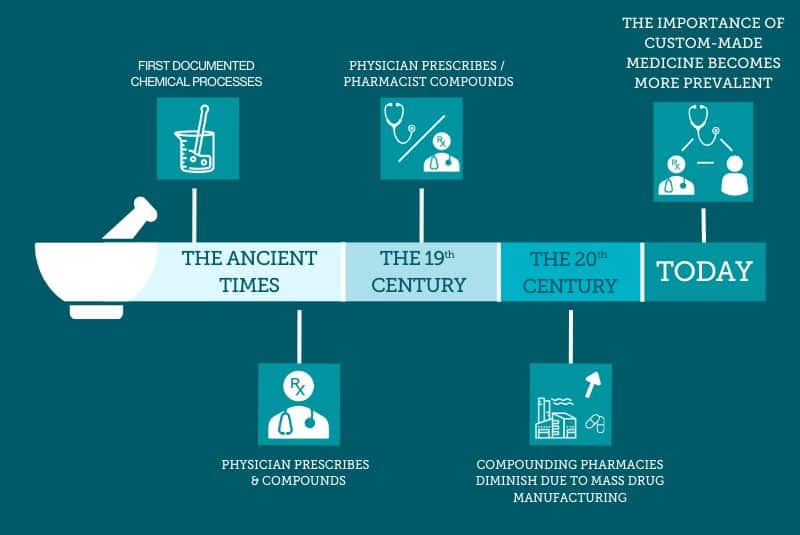- Home
- Product
- Patient
- Order Online
- Prescription Quote
- Collect at your Pharmacy
- Find a Pharmacy
- Find a Integrative Doctor
- Track my Medicine
- What is a Compounding Pharmacy?
- Child Friendly Medication
- Vet & Animal Compounding
- Easy to Swallow Pills
- Motion & Seasickness
- Medication without the Additives
- Unavailable Medications
- Schedule 8 Shipping Waiver
- Pharmacists
- Prescribers
- Shop
- FAQs
- About
- Careers
- Contact Us
- Home
- Product
- Patient
- Order Online
- Prescription Quote
- Collect at your Pharmacy
- Find a Pharmacy
- Find a Integrative Doctor
- Track my Medicine
- What is a Compounding Pharmacy?
- Child Friendly Medication
- Vet & Animal Compounding
- Easy to Swallow Pills
- Motion & Seasickness
- Medication without the Additives
- Unavailable Medications
- Schedule 8 Shipping Waiver
- Pharmacists
- Prescribers
- Shop
- FAQs
- About
- Careers
- Contact Us
The Evolution of Pharmacy: Mysticism to Modern Medicine

Looking into history is one of the most beneficial ways we can not only avoid the mistakes of the past, but learn about the achievements of our predecessors. Revisiting the history of pharmacy and medicine helps us understand how the relationships and industry have changed and evolved through time.
Pharmacy is a discipline that involves both scientific and artistic aspects, and is focused on the preparation and standardisation of drugs. It’s an essential and part of healthcare, and has played a significant role in improving the health and wellbeing of individuals worldwide. The evolution of pharmacy, ranging from the ancient times to the modern era is a crucial reflection of the advancements in science, technology, and healthcare systems.
There has been some arguments about the origin of the word “pharmacy”. Most believe that the word came from the Egyptian term ph-ar-maki or the bestower of security, which the god Thoth, patron of physicians, conferred as approbation on a ferryman who had managed a safe crossing. However, the word pharmacy and its many cognates derived, like many of the other scientific terms, most likely originates from the Greeks phar-mak-on or remedy.
Ancient Times
In ancient times, pharmacy was primarily associated with religion and mysticism. The Greeks believed that illness was divine punishment, and that healing or medicine was a gift from the gods. Their pharmacists were considered healers who had access to divine knowledge. The ancient Egyptians also had a rich history of using their advanced knowledge of natural remedies and herbs for treating various ailments.
The Middle Ages
During the Middle Ages, pharmacy began to shift towards a more scientific approach. Alchemists experimented with various substances in search of the elixir of life and other mystical cures. Alchemists were also instrumental in developing new medicines, such as the use of mercury as a treatment for syphilis.
The Renaissance
In the Renaissance period, pharmacy began to take on a more professional and scientific approach. The printing press enabled the widespread dissemination of medical knowledge, and pharmacists began to organise themselves into professional organisations. Pharmacists also began to focus on the preparation and compounding of medicines, which led to the development of new drugs to treat various ailments.
Previous Centuries
During the 19th and 20th centuries, pharmacy continued to evolve and adapt to new challenges and opportunities. The introduction of new technologies, such as the microscope, enabled pharmacists to better understand the composition of drugs and the different mechanisms of disease. The development of new medicines, such as antibiotics, transformed the field of pharmacy and revolutionised the treatment of infections.
The Modern Era
In recent years, the field of pharmacy has become increasingly specialised and regulated. Today’s pharmacists are highly educated professionals who work closely with physicians and other healthcare providers to ensure that patients receive safe and effective treatment and medications. They are responsible for dispensing and compounding medications, as well as counselling patients on how to use them safely and effectively.
In conclusion, the history of pharmacy is a fascinating and complex one that spans thousands of years. From it’s roots in ancient civilisations to the highly regulated and specialised field of today, pharmacy has played a crucial role in improving the health and wellbeing of individuals worldwide. As the field of pharmacy continues to evolve and adapt to new challenges and opportunities, it will remain an essential part of the healthcare system and a crucial component of patient care.
Note from National Custom Compounding:
For any information and no obligation advice, please either contact us on 1300 731 755, email us at [email protected] or come in and see us at our Merrimac lab.
[optin-monster-inline slug=”oqqklvasafov6yvbfsuo”]
